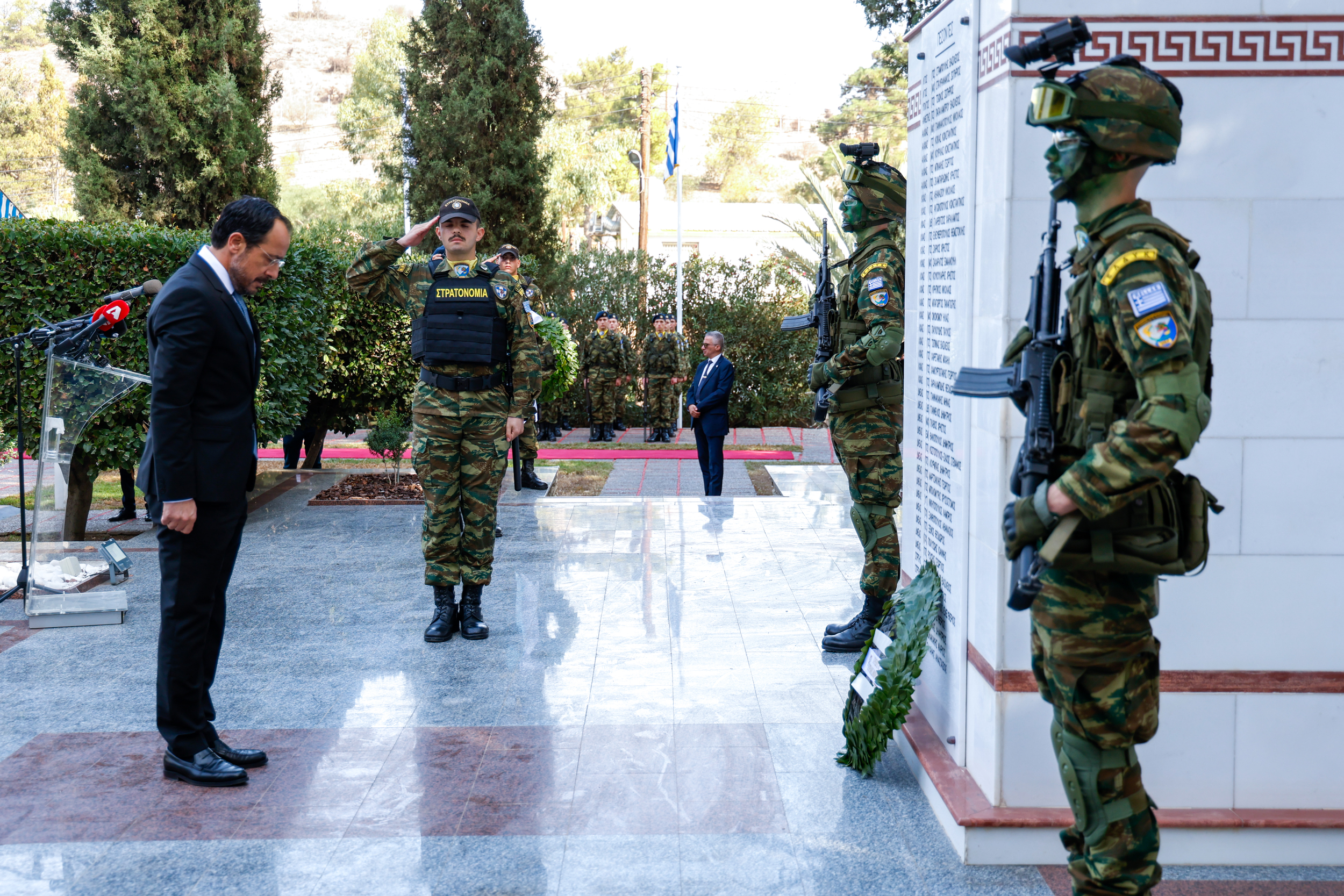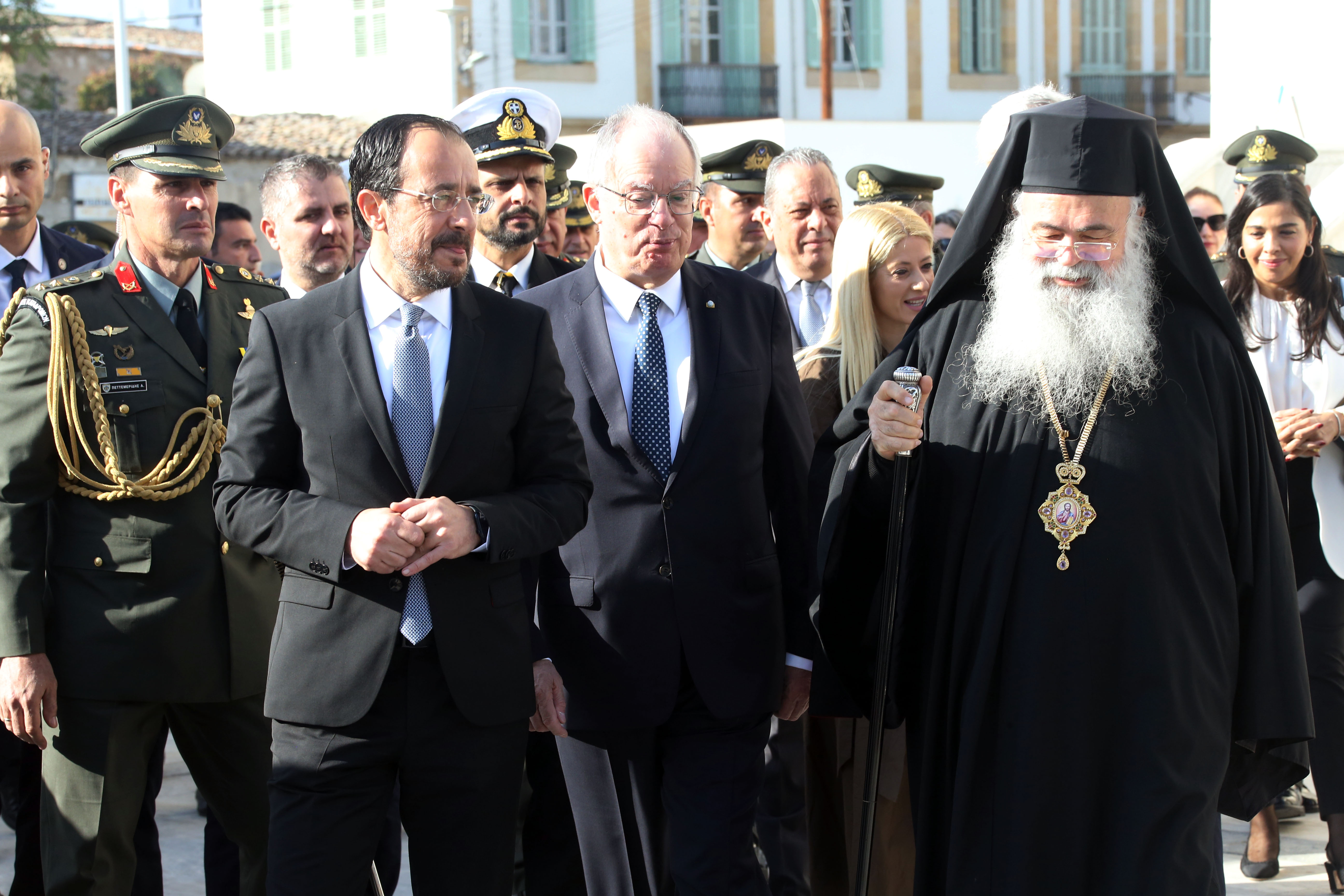President Nikos Christodoulides and Greek President Konstantinos Tasoulas on Friday awarded two honorary medals to soldiers of the Hellenic Force in Cyprus (Eldyk) who fought during the Turkish invasion in 1974.
“Eldyk is an integral part of the history of the Republic of Cyprus. It was established under the Treaty of Establishment, and its 65-year presence is tied to the dramatic events that have marked our country from its first steps as an independent state to today,” Christodoulides said.
Speaking at the Eldyk headquarters at the Lieutenant General Stavrianakos Sotiriou military camp in Malounta, the president expressed his respect for the soldiers who served during the war.
“We will never forget the help you offered us in those difficult times, when our people were searching for a reservoir of hope to remain standing,” he said.
Two medals – one for “valour and bravery” and the other for “defender of democracy and freedom” – which had previously been awarded to all fallen Eldyk soldiers, were symbolically presented to the Eldyk flag.
“With this flag, Eldyk landed in our country in 1960 and took part in the 1974 war operations, carrying out acts of heroism and self-sacrifice on the battlefield,” Christodoulides said.
Greek president Konstantinos Tasoulas expressed gratitude to Christodoulides and the government for the initiative, saying the ceremony should not be seen merely as a tribute to heroism but as an oath “to stand worthy of those who fell, of those who are still missing.”
“Greece and Cyprus, united by age-old fraternal ties, continue to fight together for a just and viable solution to the Cyprus problem that will end the occupation and reunite Cyprus as a peaceful, democratic and European state,” he said.

Tasoulas assured Christodoulides of Greece’s continued support for reunification efforts and highlighted the symbolism of Eldyk’s presence amid the island’s ongoing division.
“It is a living symbol that Greece does not forget, does not avert its gaze. That Greece is here, and that our bonds do not bend in difficulties but are strengthened by them,” he said.
Christodoulides, acknowledging the support Eldyk soldiers offered during the war, spoke of a “moral debt,” adding that the ceremony served as a “symbol of eternal appreciation and respect.”
“Our debt to them is even greater when we consider that with their sacrifice they eased the wound caused by the most recent tragedy of Hellenism – a wound that still bleeds today,” he said.
The president noted that 26 of the 105 fallen Eldyk soldiers remain missing and that access to military archives in the north continues to be denied, preventing the determination of their fate.
“These are just some of the indications of Turkey’s protracted crime, which we are working to end through the pursuit of a viable and functional solution to the Cyprus problem, based on the agreed UN framework and the principles and values of the European Union,” he said.
“And I wish today, from the headquarters of the honored Eldyk, to send the message to all directions that for us a solution to the Cyprus problem without the withdrawal of the Turkish occupying troops cannot be accepted. Nor can we settle for an arrangement that will keep our country captive to anachronistic guarantees and logic of the Cold War period of the 50s,” Christodoulides said.
Christodoulides added that Eldyk forces helped prevent Turkish troops from fully capturing Nicosia and remained an integral part of the Republic’s history.
“From the Turkish mutiny of 1963-1964, during which Eldyk suffered its first losses, until the illegal Turkish invasion of 1974, the presence of the force in Cyprus was a serious deterrent factor to Ankara’s partitionist plans,” the president said.
Concluding his remarks, the president emphasised the depth of the relationship between Greeks and Cypriots, describing Greece as the island’s “most stable, most consistent, and most selfless ally” in the struggle for reunification.
Eldyk, in turn, awarded the President an honorary plaque and a statue of an Eldyk fighter, which Christodoulides said he gratefully accepted on behalf of the Cypriot people, thanking the force for its service to the Republic.
According to figures from 2017, around 950 Eldyk soldiers are currently stationed on the island.
Eldyk’s interventions in Cyprus are viewed by some as a symbol of foreign involvement, and the force remains a controversial stakeholder in the context of the Cyprus problem and the 1974 invasion.






Click here to change your cookie preferences